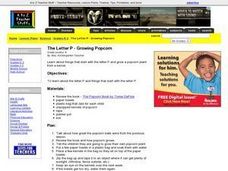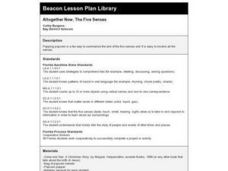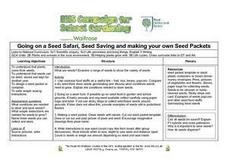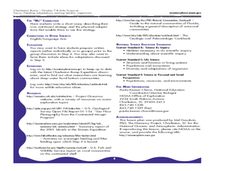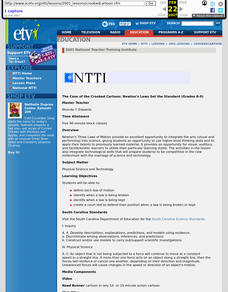Curated OER
Popcorn Science: Pop Goes the Kernel!
Young scholars conduct various experiments to determine why popcorn pops. They design tests to determine the effect of water in the kernels on its popping. Once the experiments are completed, they write summaries of them proving or...
Curated OER
Popcorn History
Students investigate the history of popcorn. They research the history of popcorn using the internet. Students work in small groups to create a timeline outlining the history of popcorn.
Curated OER
The Letter P-Growing Popcorn
Students explore the letter P and things that start with the letter P. They read The Popcorn Book by Tomie DePola. Students discuss things that start with the letter P. They plant their own popcorn plant and watch as the popcorn seeds...
Curated OER
Butterfly Life Cycle
Create colorful butterfly models that display the stages in a butterfly's life with young learners. They will identify the stages in a butterfly's life cycle. Then they will create a butterfly model, arranging the stages of a butterfly's...
Curated OER
Five Senses Dice
Engage young learners in exploring the five senses with this fun dice template. Including pictures of a mouth, ear, nose, hand, and eye, this resource allows children to demonstrate their knowledge of body parts and what they are used for.
Curated OER
Altogether Now, The Five Senses
Students make popcorn to summarize end of five senses unit.
Curated OER
What Would Halloween be Like Without the Ecuadorian Rainforest?
Fourth graders are given a number of typical Halloween treats and work in groups to determine which foods came from the Rainforest (chocolate) and which foods came from temperate regions (apples, popcorn) and treats that don't have...
Curated OER
Poppin Popcorn
Students use their senses to write descriptive sentences. In this descriptive writing instructional activity, students discuss their senses. Students are asked to look at and feel unpopped corn kernels. Students then write descriptions...
Curated OER
Going on a Seed Safari
Students describe biology by identifying different plants in class. In this seed lesson, students discuss the process of how a plant grows from seed to leaves. Students attend a field trip to their garden or another park and collect a...
Curated OER
A Day Full of Popcorn
Learners use the "tool" popcorn with activities in Language Arts, Math, Social Studies, P.E., Music, Art, Science and EATING.
Curated OER
It's too loud!
Investigate soft, loud, and dangerous sounds. Little ones put a check next to the sounds that are loud, an X next to ones that are soft, and circle the ones that would require protective ear wear. Tip: Get out a tape player or computer...
Curated OER
How Am I Supposed to Eat THAT?
Students explain nutritional strategies of benthic organisms.They describe nutritional strategies of benthic organisms and describe these physical characteristics.
Curated OER
Turn Off the TV
In this vocabulary usage online/interactive activity, students fill in the blanks in sentences with vocabulary words from the word bank. Students fill in 10 blanks.
Curated OER
What's the Matter?
Young scholars explore matter. In this matter and technology lesson, students locate examples of solids, liquids, and gases inside and outside the classroom, and record their findings in a graphic organizer. Young scholars listen to...
Curated OER
Corn
For this reading comprehension worksheet, students read a passage about corn. They then answer the 10 reading comprehension and vocabulary questions at the bottom of the page.
Curated OER
Understanding Radon Detection
In this understanding radon detection worksheet, 6th graders read 8 facts about radon, make observations about and draw pictures of hidden objects, use a chart of elements to answer questions about radon.
Hubbard's Cupboard
The Pilgrims' First Thanksgiving
Students explore holidays by participating in class singing activities. In this Thanksgiving history lesson, students discuss the importance of Thanksgiving Day and read several poems which discuss the history of Thanksgiving. Students...
Curated OER
Word Choice: To, Too, Two
In these word choice worksheets, students read the sentences and complete them with one of the word choice options of to, too, or two.
Curated OER
The Case of the Crooked Cartoon: Newton's Laws Set the Standard
Students have the opportunity to use higher-level thinking skills and to apply their talents to previously learned material. It provides an opportunity for visual, auditory, and tactile/kinetic learners to utilize their particular...
Curated OER
Energy Consumption
Students investigate the power consumption of household objects by using a classification sheet. In this energy conservation lesson plan, students read through a list of household items and tools and organize them by predicting which...
Curated OER
ESL Activity - Authentic Cooking Experience
Students encounter imperatives used for the instructions for this cooking experience. They review selected vocabulary terms for food and the process of cooking. Students identify adverbs of sequence (first, then, etc.). They follow the...
Curated OER
Second Grade English/Language Arts Quiz
For this language worksheet, 2nd graders complete multiple choice questions about sentence structure, parts of speech, dictionary work, and more. Students complete 15 questions.




